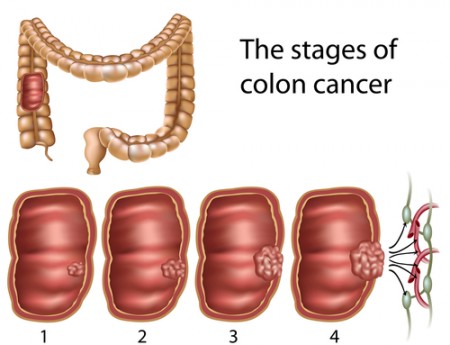May 13, 2015 – Back in April I had my five-year colonoscopy examination. I have to have it every five years because polyps have been detected during two tests. They were not cancerous or even pre-cancerous. But the presence of polyps, particularly adenomas, could be an early warning sign of risk for getting colorectal cancer.
In Canada, colorectal cancer is ranked third in cancer occurrence and second as the most common cause of death from cancer. Early detection through screening like a colonoscopy can be your best protection. But prepping for as much as 48 hours before the test is never an enjoyable task and as a result most of us avoid baring ourselves for a half-day at a hospital or clinic where colonoscopies are performed.
But from the National Cancer Institute of Canada, come colorectal cancer facts that you need to know:
- 423 Canadians each week on average are diagnosed with colorectal cancer.
- 175 Canadians die from the disease each week.
- 1 in 14 Canadian men develop colorectal cancer.
- 1 in 27 die from it.
- 1 in 15 Canadian women develop colorectal cancer.
- 1 in 31 die from it.
- If you are 50 years of age or older regardless of family history you should be screened for the disease.
With regular screening this is a cancer that is preventable. Researchers believe diet can play a part. High intakes of red and processed meats in the diet are thought to be enablers as they appear to be for lots of acquired diseases. So are lifestyle habits with regular exercise deemed to be a preventative. Studies at Washington University in St. Louis compared obesity, inactivity, red and processed meat intake, alcohol and cigarette smoking and concluded that 80% of colorectal cancer was preventable. The study indicated 6% attributable to red meat and 5% to alcohol consumption. Another study involving 77,000 participants showed that incidents of colorectal cancer could be cut by half cutting out smoking and drinking, and eating fish rather than any other meat.
Trying to prevent even the polyps that could indicate a greater propensity to get colorectal cancer is leading to a number of different chemotherapeutic experiments and trials.
At McGill University, Dr. Michael Pollak, an oncologist, is testing metformin, a diabetes drug that controls blood sugar levels, in clinical trial as a potential colorectal cancer preventative. The drug slows down the growth of epithelial cells in the gut, the exact of what happens when a cancer starts to form.
At University of Pittsburgh Dr. Robert Schoen, a gastroenterologist, is conducting what may prove to be the most interesting research into a colorectal cancer preventative. His clinical trial involves a three-shot protocol of vaccine designed to prime the immune system to recognize early onset colorectal cancer in patients deemed to be highly vulnerable. Dr. Schoen believes that the vaccine can be administered as a preventative or during early onset stopping the cancer in its tracks by prompting the immune system to recognize the presence of a protein, MUC1, found in colorectal adenomas. In a trial involving 40 patients who had advanced adenomas removed, the protocol boosted the immune response in almost half of the participants after a year. The trial has been expanded to multiple sites based on these initial results.
So we may have a cure and preventative for colorectal cancer in the next 5 years. That’s when I’m due for my next colonoscopy.












